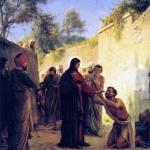
Many years ago, during a worthlessness spell (which many of us seem to occasionally suffer), I heard a song that changed my life. I did not hear it again until a few days ago, sung by the Tabernacle Choir at Temple Square. But these words have echoed in my mind: “His eye is on the sparrow/And I knew he watches me.” Like a sparrow, we have falls—as part of the mortal experience. I’ve learned to trust in God, who watches over his sparrows and His human children.
God knows where we are, and He knows the help we need from him.
Introducing “Mr. A. Sparrow”
Mr. Sparrow comes with a calling card: “Are not two sparrows sold for a farthing? and one of them shall not fall on the ground without your Father [seeing] . . . ye are of more value than many sparrows.” (If you have ever felt like half a farthing, forget it!)
Value can be assessed in many ways. A sparrow may be considered as a bird, a myth, or a symbol. On a website creatively labeled www.birdzilla.com, Brianna Goulet introduced a bird worth knowing. Sparrows live on all the world’s continents but Antarctica; they eat just about anything but prefer seeds and insects. Sparrows work hard—often all day and all night.
We don’t consider a sparrow “eye-catching,” but other sparrows do. Birdzilla notes they are “highly social birds” who “tend to stick together” and live in communities. If another sparrow needs food, they share. Sparrows sometimes sing together in their beautiful voices.
Being creatures without borders, sparrows are represented in world mythology. In discussing World Sparrow Day, the website earth.com explained that ancient Egyptians believed sparrows could “catch the souls of the recently deceased.” The site also mentioned that in Greece a sparrow was the “sacred bird” of Aphrodite, the goddess of love. “True love” added a spiritual dimension.
A sparrow is very useful symbol. The above sites mention several. Strange perhaps, but the hard-working sparrows represent good luck. Knowing their sociality, we see hope, harmony, joy, and friendship as logical connections. In biblical times, a sparrow was “a poor man’s sacrifice” for the temple and, tragically, a “poor man’s food.”
Singing for Sparrows
A moving sparrow story became a moving sparrow song.
Civilla and William Martin, both devoted Christians, were friends with Mrs. Doolittle, who had been bedridden for 20 years, and her husband, who lived from a wheelchair. Civilla wrote, “Despite their afflictions, they lived happy Christian lives, bringing inspiration and comfort to all who knew them.” When asked for “the secret” of their “bright hopefulness,” Mrs. Doolittle replied simply, “His eye is on the sparrow, and I know he watches me.”
Civilla wrote this “classic Christian hymn.” Lines below share its meaning and its tone.
Jesus is my portion,
My constant Friend is he;
His eye is on the sparrow,
And I know he watches me;
Though by the path he leadeth,
But one step I may see;
His eye is on the sparrow,
And I know he watches me;
Trusting God’s Watch Care
Truly Jesus is our friend and our leader. Many of those who trust and follow Him are in some ways like the sparrows that God watches with care. They are concerned about others—choosing to live where they can relate to and build relationships with them. They feed those who are hungry, they work hard together, and they sing together.
David A. Bednar spoke of pioneers who we might call the sparrows of the migration—those who struggled to come in as the last wagon in each company. Recalling praise written earlier by J. Reuben Clark (former counselor in the Church First Presidency), Elder Bednar described “these anonymous and uncelebrated heroes who, day after day, week after week, and month after month, choked on the dust stirred up by all of the wagons rolling in front of them—and who overcame the relentless obstacles they encountered along the way.”
Elder Bednar quoted Elder Clark.
They of the last wagon pressed forward, worn and tired, footsore, sometimes almost disheartened, borne up by their faith that God loved them, that the restored gospel was true, and that the Lord led and directed the Brethren out in front.”
Elder Clark concluded his message with this stirring tribute: “To these humble souls, great in faith, great in work, great in righteous living, great in fashioning our priceless heritage, I humbly render my love, my respect, my reverent homage.”
In today’s fast, crowded, tense, confusing, and so contradictory societies and cultures, we badly need a perspective voiced in a quotation I love from “The Weight of Glory” by C.S. Lewis.
The dullest most uninteresting person you can talk to may one day be a creature which, if you saw it now, you would be strongly tempted to worship . . . There are no ordinary people. You have never talked to a mere mortal.
We invite you to join Christ’s disciples and followers, the singers of the Tabernacle Choir, the only-physically-afflicted Doolittles, the pioneers in the last wagon, and the mortals who haven’t yet discovered they are not ordinary as we sing the refrain from Civilla’s sparrow hymn.
I sing because I’m happy,
I sing because I’m free;
For his eye is on the sparrow,
And I know he watches me.













